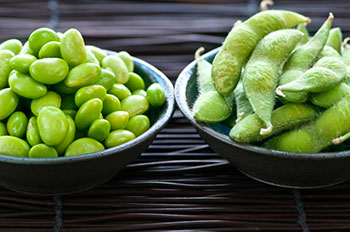More Health and Nutrition Bites
Related
Is edamame (soy beans) safe for breast cancer survivors?
What we know about soy and breast cancer has been a little difficult to interpret because most of the research offers us only indirect evidence. Ideally, research would be performed that would have women eat more soy products after being diagnosed with breast cancer and compare them with those without disease to see if there are higher or lower rates of recurrence. It's unlikely that we'll have that sort of information anytime soon.
Soy and Your Risk of Breast Cancer
Many cancer docs tell those women with estrogen-receptor positive breast cancer to avoid eating soybeans. Why? Because they contain a comparatively high level of isoflavones (phytoestrogens), which are naturally occurring chemicals that resemble natural estrogen. Soybeans (edamame) are a major source of protein in the Asian diet, and at least one study has reported that Chinese women who eat a lot of soy actually have a reduced risk of breast cancer. Which is right?
Mediterranean Diet and Breast Cancer Risk
We know that following a Mediterranean style diet is linked with lower incidence of heart disease, high blood pressure, and cancers. Until recently, few studies have looked specifically at the Mediterranean Diet and the risk of breast cancer. Those studies that have been published have looked at only olive oil and breast cancer, or have taken place in the United States, where most people do not adhere to a Mediterranean Diet. What has been lacking has been a study focused on the Mediterranean Diet in a country where the Mediterranean Diet is the dominant style of eating.
Health & Nutrition Bites
Get the latest health and diet news - along with what you can do about it - sent to your Inbox once a week. Get Dr. Gourmet's Health and Nutrition Bites sent to you via email. Sign up now!
Soy intake and metabolic syndrome

The metabolic syndrome is a term used for a grouping of symptoms, which include poor cholesterol scores, high blood pressure, abdominal obesity, and high glucose levels. The metabolic syndrome carries with it an increased risk of type 2 diabetes and heart disease. It's also been shown to lead to an increased risk of Alzheimer's Disease (Metabolic syndrome and Alzheimer's, 1/10/07). While this syndrome may have some genetic links, it's clear that what people eat can play a large role in each of the symptoms that make up the syndrome. We also know that simple changes in diet can often help reduce or eliminate these symptoms. But which ones might be most effective?
Scientists in Iran noted that many studies report beneficial effects of soy consumption for humans, but the only test of the effects of soy consumption on metabolic syndrome had been on animals. They therefore designed a study to look at the effects of soy consumption on humans (Am J Clin Nutr 2007;85:(3)735-41).
Forty-two postmenopausal women with metabolic syndrome were recruited to participate in the dietary study. The control diet's protein source was red meat, while two other diets got their protein from soy nuts or from a processed soy protein. The three diets were otherwise substantially the same and were designed to maintain each subject's weight. Each participant followed each of the three diets in random order for eight weeks, with 4-week breaks between each diet. Their weight and height (Body Mass Index), blood glucose and cholesterol, insulin resistance, and blood pressure were measured for each participant before and after each of the three diets.
They found that while both types of soy helped with several of the symptoms of metabolic syndrome, it was the soy-nut diet that had the most effect on cholesterol levels, including total cholesterol, LDL cholesterol (the bad stuff), and triglycerides. It also appeared to have more of a positive effect on insulin resistance.
What this means for you
The scientists rightly note that there is some evidence that excessive soy-protein intake could actually stimulate estrogen-positive breast cancers to grow due to the estrogens in soy. That said, adding a moderate amount of soy (also called edamame) to your regular diet is a delicious way to help reduce your risk of heart disease. Try a recipe with soy in it: Cashew Chicken, Ginger Chicken with Edamame, or Tuna with Wasabi Pea Crust.
First posted: March 20, 2007
